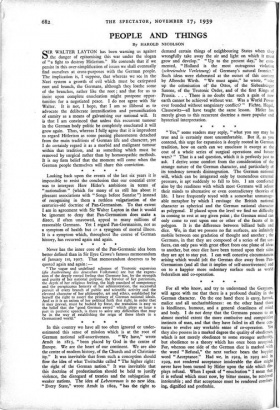Never has the inner core of the Pan-Germanic idea been
better defined than in Sir Eyre Crowe's famous memorandum of January ist, 1907. That memorandum deserves to be quoted again and again:— " The vague and undefined schemes of Teutonic expansion (die Ausbreitung des deutschen Volkstums) are but the expres- sion of the deeply rooted feeling that Germany has, by the strength and purity of her national purpose, the fervour of her patriotism, the depth of her religious feeling, the high standard of competency and the perspicuous honesty of her administration, the successful pursuit of every branch of public and scientific activity and the elevated character of her philosophy, art and ethics, established for herself the right to assert the primacy of. German national ideals. And as it is an axiom of her political faith that right, in order that it may prevail, must be backed by force, the transition is easy to the belief that the `good German sword' which plays so large a part in patriotic speech, is there to solve any difficulties that may be in the way of establishing the reign of those ideals in a Germanised world."




































































 Previous page
Previous page